ICCS / BEL is the Project Coordinator for RETENTION
HEART FAILURE PATIENT MANAGEMENT AND INTERVENTIONS USING CONTINUOUS PATIENT MONITORING OUTSIDE HOSPITALS AND REAL WORLD DATA
REAL WORLD DATA-DRIVEN APPROACH: Innovative model driven big data analytics, statistical, artificial intelligence and machine learning techniques are deployed to offer user friendly verifiable decision making capabilities regarding interventions and their effectiveness by generating new insights into disease patterns to continuously refine its patient management capabilities.
The different types of data that RETENTION will collect and analyze include:
- Standard demographic data (e.g., age, sex, marital status, home address, socio-economic status).
- Medical history data.
- Data from baseline clinical testing relevant to the particular conditions and patients targeted by the project (e.g., N-terminal pro-B-type natriuretic peptide) and periodic patient clinical testing (electrocardiography / ECG, blood tests, cardio-pulmonary exercise testing).
- Subjective patient assessments (depression and quality of life questionnaires).
- Daily collected data including patient’s weight body fat, skeletal muscle and body water, blood pressure (excluding patients with VAD), heart rate, peripheral capillary oxygen saturation, deep and light sleep phases and sleep interruptions, fluid balance (intake / diuresis), adherence to prescribed medication, nutrition intake, circadian rhythm, physical activity data (steps, distance, floors climbed, calories burned).
- Daily collected data from VADs, if used by the patient.
BEL is participating in:
- WP1 ETHICS REQUIREMENTS: This work package sets out the ‘ethics requirements’ that the project must comply with. Law and ethics are closely connected, in the sense that both disciplines look into fundamental human values that are either enshrined in binding legal texts and other self-regulatory instruments (e.g., codes of conduct) or -to an extent- reflected in social norms shaping human behavior accordingly. In this respect and considering the scope of RETENTION, the ethical and legal aspects associated to the design and use of AI (e.g., human oversight, decision making, protection of personal data), will be an integral part of the project foundations.
- WP2 PROJECT MANAGEMENT: WP 2 Project Management This work package coordinates all technical, clinical, innovation and administrative project activities and ensures the compliance with the Grant Agreement, the Consortium Agreement, the Description of Action and Quality Plan. It also sets the overall strategic plans, facilitates communication and interactions within the consortium, establishes a smooth collaboration and a common understanding among the teams, enforces mechanisms to timely identify risks and deviations, takes corrective measures and facilitates the management of the innovation processes related to the project outcomes. Finally, it produces reports on project progress and ensures the effective use of resources for realizing project activities.
- WP4 RETENTION DATA MANAGEMENT: The activities envisaged in WP4 include the design and development of the data modelling and data management capabilities of the RETENTION platform, including the definition of the models, based on the specifications of the platform architecture, and deployment of the data repositories. Furthermore, it includes the deployment of the computing infrastructure needed to support the models’ computational requirements, by enabling the exchange of the globally anonymized data, the collection, storage and processing of the heterogeneous aggregated data, generated during the platform’s operation.

